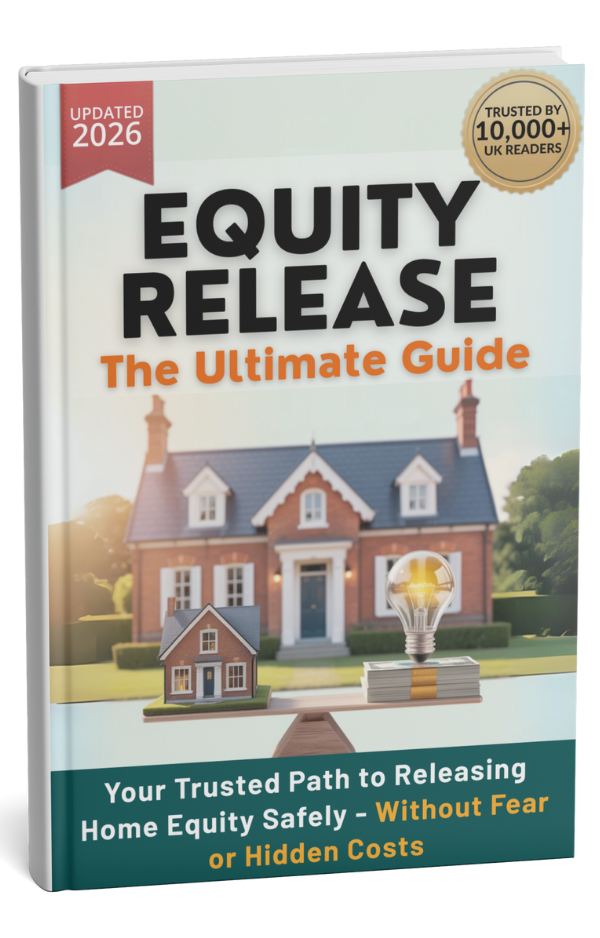
What Is a Reverse Mortgage and How Does It Work in the UK?
Key Takeaways...
- Reverse mortgages let you access your home’s equity as tax-free cash if you are 55 or older.
- No monthly repayments are required; the loan is settled when the property is sold.
- Interest compounds over time, increasing the total amount owed.
- You must maintain your home and keep up with insurance and taxes to avoid risk of repossession.
- The amount you can borrow depends on your age, property value, and lender criteria.
- Reverse mortgages can impact inheritance and eligibility for certain benefits.
- Always seek professional advice and compare options before proceeding.
In 2026, a reverse mortgage allows homeowners to convert part of their home equity into cash whilst retaining ownership, with repayment deferred until the home is sold. This offers financial security in retirement amid volatile house prices and escalating mortgage debt.1
When considering different types of equity release schemes, reverse mortgages mean you could potentially tap into your property’s equity without needing to sell or move.
According to the Financial Conduct Authority (FCA), the outstanding value of all residential mortgage loans in the UK was £1.68tln at the end of 2022 Q4, 3.9% higher than a year earlier.2
Does this mean a reverse mortgage could work to your advantage?
In This Article, You Will Discover:
EveryInvestor’s financial experts are committed to providing the most current and accurate information to help you with your later-life lending decisions.
We maintain unbiased and transparent articles and guides by thoroughly fact-checking all provided information.
This guide provides comprehensive information on the workings, benefits, and considerations of reverse mortgages in the UK to help you make an informed decision.
Therefore...
What Is a Reverse Mortgage?
A reverse mortgage is a loan secured against your home that allows you to release cash from its value without selling the property.
Unlike a standard mortgage, repayments are deferred until the home is sold, typically when you no longer live there.
In the UK, this is most commonly known as a lifetime mortgage, a type of equity release.

How Does a Reverse Mortgage Work?
With a reverse mortgage, homeowners aged 55 and over can borrow against their home’s value. The funds can be received as a lump sum, regular withdrawals, or a combination.
No monthly repayments are required. Instead, the loan and accrued interest are repaid when the home is sold, usually after the homeowner passes away or moves into long-term care.
Over time, the amount owed increases due to compounding interest, which can significantly reduce the equity left in the property for inheritance.
Which Providers Offer Reverse Mortgages in the UK?
Providers offering reverse mortgages in the UK include leading financial institutions and lenders, including Aviva, More2Life, and Legal & General, each with unique terms and conditions tailored to meet the needs of older homeowners seeking financial flexibility in retirement.

Some of the most well-known and reputable lenders are...
If you are unsure of who to contact, it is best to talk to your financial advisor, who can help you find a suitable reverse mortgage provider based on your needs and goals.
Reverse Mortgage vs Equity Release: What’s the Difference?

Equity release is a broad term in the UK, covering various schemes that let you unlock your property’s value while continuing to live there.
The two main types are lifetime mortgages (reverse mortgages) and home reversion plans.
A reverse mortgage is a specific type of equity release that provides a loan based on your home’s value, with repayment deferred until you pass away or sell your home.
All reverse mortgages are equity release products, but not all equity release products are reverse mortgages.
For a detailed breakdown, see our equity release costs checklist.
Eligibility and Rules in the UK
To qualify for a reverse mortgage in the UK, you must:
- Be at least 55 years old (some lenders may set a higher minimum age).
- Own your home outright or have a small remaining mortgage that can be paid off with the reverse mortgage.
- Live in the property as your main residence for at least six months of the year.
- Have a property typically worth at least £70,000 (some lenders require £75,000 or more).
- Meet lender criteria regarding property type, condition, and location.
Lenders will also assess your ability to maintain the property and cover associated costs, though your income is less important than with standard mortgages.
Who Benefits Most (and Who Should Avoid)?
Reverse mortgages are best suited for older homeowners who want to supplement retirement income without selling their home. They are ideal for those who:
- Need extra money due to low or fixed income.
- Want to access home equity without moving.
- Seek financial flexibility in later life.
However, you should consider alternatives if you:
- Want to preserve your home’s value for heirs.
- Have other assets or savings to draw on.
- Qualify for means-tested benefits (as these may be affected).
- Plan to move or downsize soon.
- Are uncomfortable with increasing debt and compound interest.
Consulting a qualified adviser is essential to assess if this is the right option for your circumstances.
Types of Reverse Mortgages and Key Features

There are several types of reverse mortgages in the UK, each with specific features:
Drawdown Lifetime Mortgage
Allows you to take an initial lump sum and then withdraw smaller amounts as needed from a pre-agreed cash reserve.
Lump Sum Lifetime Mortgage
Provides a single, large payment from your home equity, ideal for significant expenses or investments.
Enhanced Lifetime Mortgage
Offers larger loan amounts to homeowners with specific health conditions or higher home values.
Flexible Reverse Mortgage
Lets you make monthly repayments to cover interest, so your debt does not increase over time. This is suitable for those still working or wanting to protect inheritance.
Pros and Cons of Reverse Mortgages

Before deciding, it’s important to weigh the advantages and disadvantages.
Advantages
- Access tax-free cash for retirement needs.
- No monthly repayments required.
- Continue living in your home.
- Flexible options for lump sum or drawdown.
- No negative equity guarantee (you’ll never owe more than your home’s value).
- Can move to another house if the lender agrees.
Disadvantages
- Reduces the value of your estate and potential inheritance.
- Debt increases over time due to compound interest.
- May affect eligibility for means-tested benefits.
- Higher interest rates and fees than standard mortgages.
- Long-term commitment that may be difficult to change or cancel.
- Must maintain the property and keep up with insurance and taxes.
How Much Can You Borrow & Current Interest Rates
The amount you can borrow depends on your age, property value, health, and lender criteria. Generally, the older you are, the more you can borrow.
Most lenders allow you to borrow between 25% and 60% of your home’s value. For example, a homeowner in their 60s might access 20–30%, while someone in their 80s could access up to 50%.
Interest rates for reverse mortgages are typically higher than standard mortgages and vary by lender, plan type, and loan-to-value ratio. As of July 2025, typical equity release rates range from 5.97% to 6.28%.
For the latest rates, see our equity release interest rates guide.

Using a Reverse Mortgage Calculator
A reverse mortgage calculator helps estimate how much you could borrow based on your age, home value, and current interest rates.
You’ll need to enter basic information such as your age, property value, and sometimes your health status.
Calculators are for illustration only and do not guarantee lender offers. Always consult a qualified adviser for accurate information before applying.
Try our lifetime mortgage calculator for a quick estimate.

Repayment and Early Exit Options
Repayment occurs when you move, sell your house, enter permanent care, or pass away. The repayment includes the borrowed amount, accumulated interest, and any fees.
Your heirs can choose to repay the loan to keep the property or sell the home to settle the debt. Some plans allow early repayment, but this may incur penalties.
Always check your lender’s terms and consult an adviser before making decisions.
Is a Reverse Mortgage Right for You? Alternatives & Scams
Deciding if a reverse mortgage is right for you involves considering alternatives and being vigilant for scams.
Alternatives include downsizing, home reversion plans, retirement interest-only mortgages, or using other assets.
Beware of scams such as unsolicited offers, pressure to sign quickly, and demands for upfront fees.
Always use a regulated adviser and check lender credentials.
For more on protecting your estate, see our inheritance protection guide.
Frequently Asked Questions About Reverse Mortgages
Usually 55, though some lenders may set a higher minimum age.
Most lenders require you to own at least 50% of your home outright, with a minimum property value of £70,000–£75,000.
Yes, it can impact eligibility for means-tested benefits such as Pension Credit or Council Tax Support.
Yes, if your lender agrees and the new property meets their criteria.
You are protected by a no negative equity guarantee, so you’ll never owe more than your home’s value.
Yes, by the Financial Conduct Authority and the Equity Release Council, which set standards and safeguards for consumers.
Final Thoughts on Reverse Mortgages in the UK
Reverse mortgages, or lifetime mortgages, can provide valuable financial flexibility for retirees by unlocking home equity without selling up.
However, they come with significant implications for inheritance, long-term debt, and eligibility for benefits.
It’s essential to seek professional advice, compare plans, and fully understand the terms before proceeding.
Your decision should be based on your personal circumstances and long-term goals.
Disclaimer:
All information in this article was accurate as of July 2025. Rates, lending criteria, and eligibility rules may change. Always consult a qualified adviser before making financial decisions.






 100% private. No pressure. Just friendly guidance.
100% private. No pressure. Just friendly guidance.
